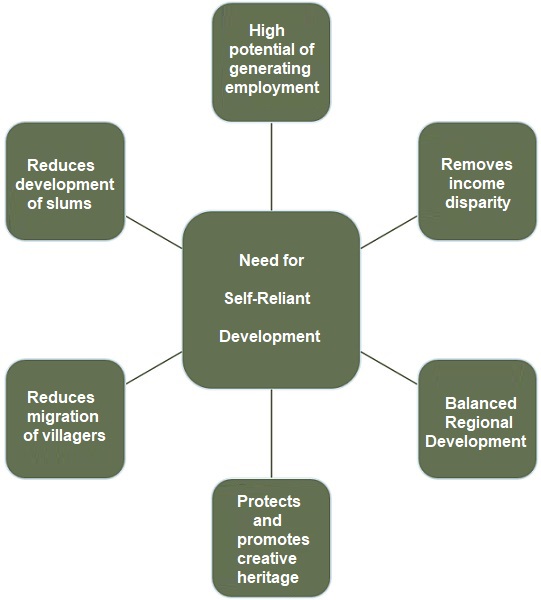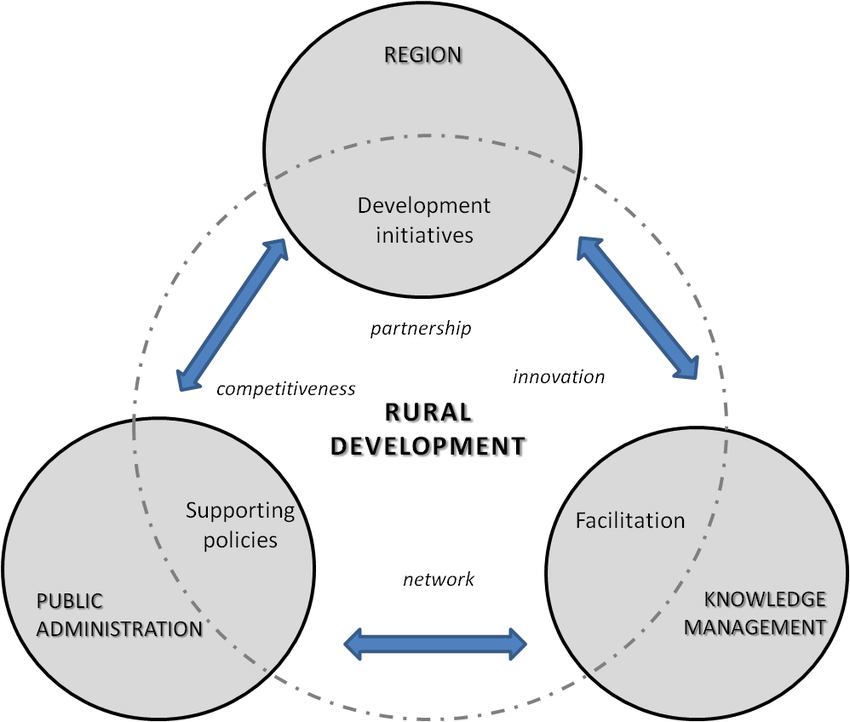While a staggering 75 per cent of the world’s poor live in rural areas, policies and resources continue to be biased in favour of urban development with detrimental effects for both rural and urban populations. Harnessing the productivity and entrepreneurial potential of rural communities is indispensable in the effort to achieve resilient economic growth that can raise people above the poverty line. Most rural inhabitants depend for their livelihood on small-scale food-crop agriculture, fishery, pastoral animal husbandry, wage labour on plantations and ranches, or ancillary activities linked to rural townships. However, increasingly smaller parcels of land, low agricultural productivity, volatile weather conditions and soil erosion compel many rural families to seek additional sources of income. Rural non-farm productive activities can contribute significantly to wealth creation and the well-being of rural communities.

Self-Reliant Development refers to the development of a new entity which pioneers new products and services, creates a new market for its offerings or uses advanced technology, in the rural area.
In simple terms, self-reliant development , which springs up in non-urban areas is termed as rural entrepreneurship. This leads to the establishment of industrial units in rural areas.
Need for Self-Reliant Development
The reasons for self-reliant development are discussed as under:

- As the rural industries are labour-intensive, they tend to have a high possibility of generating employment, which acts as a corrective measure to a number of problems causing due to unemployment stemming in the rural areas.
- Rural industries have a comparatively high potential of generating income, which reduces the disparities amidst income earned by people living in urban and rural areas.
- Self-Reliant Development stimulates the dissemination of economic activities in the village areas, which ultimately results in balanced regional development.
- It does not just protect but also promotes the art, culture and creativity, i.e. the varied heritage of that particular region.
- When industries are set up in rural areas, it advances economic development which reduces migration of the villagers to urban areas.
- Curtails unequal growth in the urban areas, decreases the development of slums, environment pollution etc.
When industries which are environment friendly are established in rural areas, it results in development without causing harm to nature and biodiversity.
Problems of Self-Reliant Development
As we know that self-reliant development in rural areas is not as easy as in urban areas. As there are a number of problems which needs to be catered. Some of them are listed as under:
- Paucity of Funds
- Lack of technical know-how
- Lack of training and development
- Non-availability of skilled labours
- Risk Element
- Legal Formalities
- Lack of technical knowledge
- Lack of Quality Control
- Lack of communication and market insights
- Lack of storage and transportation facilities
- Old and obsolete technology, machinery and equipment
- Lack of promotional strategy
- Lack of infrastructural facilities
- Poor quality standards
Besides the above challenges, one major problem encountered at the time of entrepreneurship development in rural areas is the lack of knowledge and awareness in people with regard to the significance of developing industries in the rural areas. Moreover, the rural population does not show much interest in choosing entrepreneur, as their career.
The rural population generally go for employment due to a fixed and regular income, limited working hours, no investment and less degree of responsibility. This is due to the status given to the salaried people by society than to the self-employed ones.
In addition to this, rural people also do not have much knowledge and awareness about the entrepreneurial opportunities which is open to them. And they are also not aware of the support organizations, government schemes and programmes and all the necessary information which is needed for its commencement.
Development of Self-Reliant Development
Setting up an industry in rural areas so as to develop entrepreneurship is not an easy task. Indeed it encompasses a series of activities. There are certain measures recommended for the development of entrepreneurship in the rural areas, which are discussed as under:
- Availability of Raw Material: For the establishment of any industry, the availability of adequate raw material is a must. Nevertheless, the non-availability of raw materials along with their expensiveness has weakened the growth of such industries. Over the years, it has been observed that rural industries that have a heavy raw material base produced in the rural areas itself, often sustain in the long run. Hence the rural entrepreneurs should be ensured of the proper supply of raw material.
- Creation of Finance cells: To start and operate an industry smoothly and uninterruptedly in rural areas, finance acts as a fuel. Availability of funds at the time of need, at a reasonable rate of interest, is the major requirement, which must be fulfilled. For this purpose banks and financial institutions can be opened, which can remove the hindrances caused due to the lack of finance.
- Production cum Marketing centres: Production cum marketing centres need to be established with state-of-the-art technology and advanced infrastructural facilities in the areas where the rate of production and growth is high. It encourages export business as well as bring together the buyers and sellers, and eliminates intermediaries.
- Development of Entrepreneurial Attitude: If the entrepreneurs lack aptitude and competency, it will make the industrial unit sick. So, the entrepreneurial attitude and competencies need to be developed among the would-be entrepreneurs by way of training programmes such as EDP – Entrepreneurship Development Programme.
- Entrepreneurial Education: To impart entrepreneurial skills, attitude and acumen in the youth, entrepreneurial education should be given in schools, colleges and universities. This will shape and direct the young minds to work or make their career in that field.
- Awareness: Basically, non-availability of the facilities is not a big problem, rather the big problem is the non-awareness of the facilities available for the development of rural entrepreneurship. So, the steps must be taken to make the people aware of the facilities and support provided to the entrepreneurs, to assist them in establishing the industries in rural areas.
- Institutional Training: Facilities should be made to provide institutional training to direct the entrepreneurs in the products and trades so that the resources of the region can be utilized in the best possible manner.
Of the above-given measures, setting up of marketing cooperatives is an effective way which will provide complete assistance, guidance, direction and encouragement to the rural entrepreneurs for establishing the business. These will help the rural entrepreneurs to get the desired inputs at a reasonable price, as well as they can sell their output at competitive prices.

Types of Self-Reliant Development
- Agro-Based Enterprises: As the name suggests, these enterprises indulge in the direct selling or processing of agriculture products, for example, sugar, dairy products, fruit juice, spices, oils from oilseeds, jaggery etc.
- Forest-Based Industries: Industries dealing in the supply of wood or wood products, coir industry, beedi industry, honey making, bamboo products, etc. are covered under the forest-based industry.
- Mineral Based Industries: Cement industry, stone crushing, wall coating powders, etc. are included in the mineral-based industry.
- Textile Industry: Industry in which weaving, spinning, tie and dye, colouring and bleaching of textile are carried out is covered under this category.
- Handicrafts: Craft or artistic items made of wood, bamboo, glass, jute, soil, etc. are called as handicrafts. Moreover, traditional decorative items, toys, antiques etc. are also covered here.
- Engineering Services: It may include tools and equipment used in agriculture such as tractors, pumps, pipes and fittings, repairs, etc.
The Bottom Line
Self-Reliant Development act as an important figure in the economic growth of the country, as they can help a country from developing to a developed one. This will ensure employment to the rural population which will not only remove poverty on a large scale and increase their standard of living but also decrease the migration of poor people in search of jobs to the urban areas. This will help in balanced economic development and remove income disparity.
Proven and trusted.
HSP has experience and better understanding how to create an ecosystem for self-reliant development based on visiting various developed and developing countries.
Tailored to you.
HSP's experienced team will work with you to understand your needs and identify the best solutions for your region to empower life of people.
For Further Information
Please Contact Us for more information.
